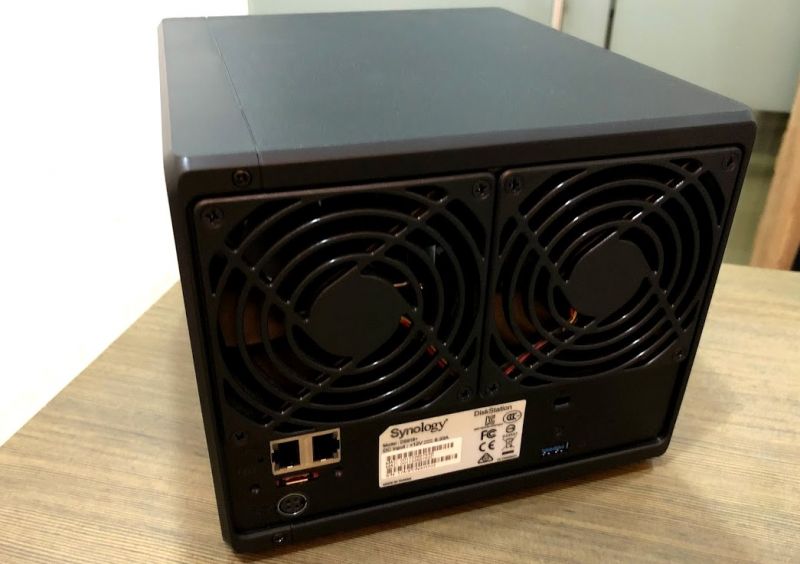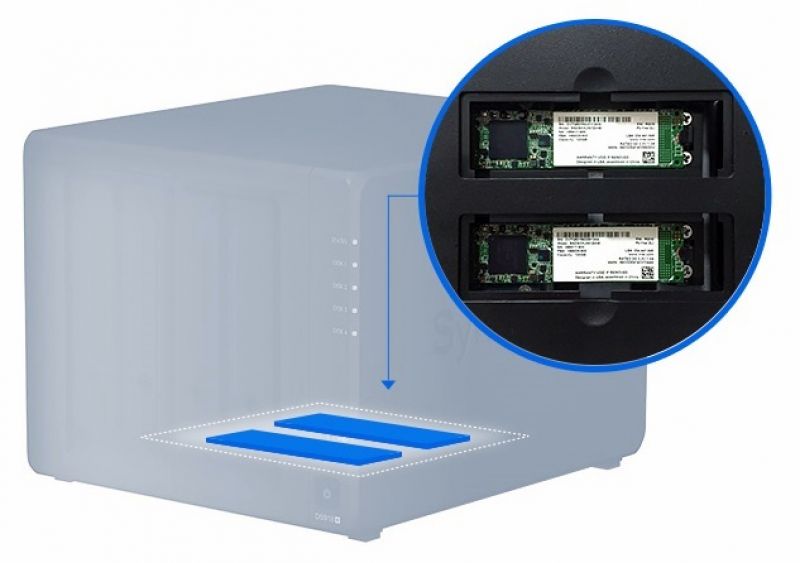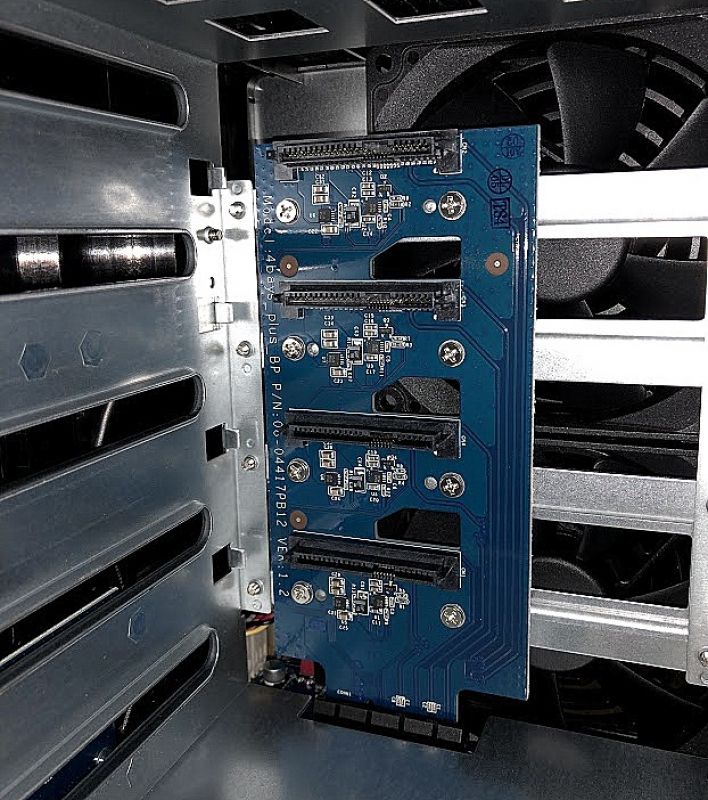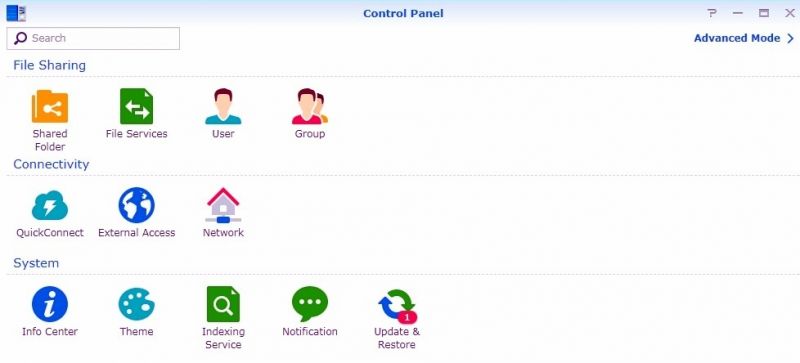Synology Diskstation DS918+ review: A powerful, easy-to-use server for home, office
This tiny server can hold up to 108TB of movies, music and photos for your home or office needs.
Verdict: Synology’s Diskmanager OS makes it very simple for any user to setup servers such as Web, DNS, Email, FTP, Video, Photo and many more. The Synology Diskstation DS918+ network storage barebone server is presently available for a retail price of Rs 79,817 in India. Prices will increase accordingly depending on the number of, capacity and type of hard drives you wish to add to the NAS. We recommend this network storage server for those who wich to build a powerful, scalable and easy to user mini server for their home or office.
Pros: Built-in M.2 NVMe SSD slots for cache expansion, ease of SODIMM memory slot access, Ease of use and configuration, 2-channel 4K transcoding availability, hardware encryption, apps for added functionality as and when needed, highly affordable.
Cons: Plastic drive bays, no proper marking of drive numbers on each bay, provision of backup button for quick USB backup on front panel, non-standard power brick, HDMI option for direct media playback could have added more value to the product.
Each home or office produces loads of data today. Gone are the days when we used to save them on pen drives — the size of files being generated is pretty huge today. Take for example a simple smartphone’s camera which blocks around 12MB of data for a single high-resolution photo. Now with multiple pics being snapped to numerous movies and music files on each phone itself, backing up to pen drives is probably impractical, leave alone expensive and slow. Saving to the cloud is the next big move but that needs a huge broadband connection, which could add to the costs, apart from buying online storage. With tons of data each person makes each year, the only possible storage area option left is your laptop or PC at home or office. However, they are limited in space too. If you have a similar issue at an office, then sharing and speed is the biggest concern. So how do you ensure your data is safe, can be shared and also remotely accessed? One and probably the only practical and cheap solution is to deploy a network storage at home or office.
Bring home (or office) the NAS, hook up some drives, click through some magical settings and voila, within minutes you can have your own super-cheap and super-convenient cloud storage right at home.
Having a centralised storage is a necessity today. Deploying cloud-based storage may be convenient and secure, but the price you pay for it is not as practical as you think. Storing your movies and videos, music and photos in one location and easy access is what a NAS can offer. You can build a NAS using a PC or laptop, but these are temporary solutions and will require you to keep the computer on at all times. NAS devices are basically meant for 24x7 operations, run on minimum software (no s/w licenses required either), are robust and can host multiple services for almost the fraction of the cost. So imagine your own private and secure cloud service on your home or office network and at the highest speeds required that can store your office documents, save your backups, stream up to 4K movies, playback your music, host your website and FTP servers, and much more.
Synology is not a new name in the industry. The brand is well-known for networking products and the Diskstation DS918+ is something that we got our hands on this month. The tiny black box can work wonders if configured to the brim and serve you with a host of services, right from website to video streaming. With the DS918+, you can run your own internet website (or intranet website), FTP services, media streaming servers, CCTV surveillance system and a lot more, at home or office. The NAS is a simple network server that can be set up with 1 to 4 hard drives, in less than 15 minutes.
Build:
The Diskstation DS918+ is a simple, square, all-black box, about the size of a small toaster. It has a matte-finished plastic exterior, with absolutely no movable parts, except for the four hot-swappable drive bays up front. The single, backlit power button upfront makes up for all the controls on this NAS, and the rest of the controls are available using the network, via any web browser. The front panel has five LEDs — one for status and four for each drive installed in the system. Also here available is a USB 3.0 port for quick access to transfer data from pen drives or external storage drives. The rear panel has the main business end.
Two Gigabit Ethernet ports, one eSATA, one USB 3.0 and a power socket are what you will see back there. Two large exhaust fans help cool the internals, which draws the air from intake vents between the four hard drives in the front. The 120mm cooling fans operate automatically for efficient cooling and can be set between quiet operation, automatic and high cooling on manual modes. Sadly, there are no dust protection filters here, so one has to make sure that the DS918+ is positioned in a clean and cool environment. The DS918+ measures 6.54x7.83x8.78 inches (WHD) and weighs just 2.3kg without the drives. Included in the DS918+ box is the DiskStation DS918+ unit, a power adapter with cord, two Ethernet cables and a set of drive locking keys.
Each drive bay is made of hard plastic, is lockable and the entire assembly is completely tool-less — meaning you won’t need a screwdriver to get this baby up and running. The drive bays can host up to four hard drives or SSDs. These four hard drives snugly fit on a metal frame, attaching themselves to the internal motherboard’s SATA ports. Each bay has a lever that needs to be pulled outwards from below to detach (and lock when inserting) itself, apart from having a secure lock so that they are not accidentally pulled out when in operation. The drives are hot-swappable, which means they can be replaced even when the NAS is in full operation but provided they are in particular RAID modes.
Internals:
The Synology Diskstation DS918+ has a strong set of guts. Built around an Intel Celeron J3455 quad-core processor clocked at 1.5GHz (which can overshoot to 2.3GHz when in full load) and 4GB of DDR3L RAM (expandable up to 8GB RAM if needed for max operations), the NAS can host up to a total of nine hard drives (using an external Synology DX517 drive bay). Each bay is compatible with 12TB hard drives, which puts this one at a max storage possibility of up to 48TB (108TB with all 9 drives after adding the DX157 bay), depending on the RAID configurations you opt for.
The motherboard also features two M.2 NVMe SSD slots, which can be opted for increasing the cache size if you are going to use this as your centralised file server on a large network. Adding RAM and NVMe SSD will require you to remove all four hard drives from the bay in order to gain easy access. The motherboard also features H.265 / H.264 4K video transcoding on the fly, and a hardware encryption engine, which makes this NAS a robust workhorse for homes and small offices. The entire NAS box is powered by an external power brick, which helps in easy power supply replacement (in case of power issues) apart from helping the internals remain cooler.
Firmware:
The Synology Diskstation features its own proprietary firmware called Disk Station Manager (DSM), which is based on Linux, one of the most stable server-level operating systems out there. The firmware is frequently updated for features and bug fixes and can be automatically applied without user intervention. The two Ethernet ports on the rear can be used for connecting an internal network and WAN simultaneously or can be connected to the same or dual network(s) for speed or isolation accordingly. The USB ports can be used for external storage, backups and connecting printers, while the eSATA port is best for highest speed storage expansion, backups and transfers. Sadly, the DS918+ does not feature any ports for Mac users.
The DS918+ with the Disk Station Manager OS is basically a standard PC with a Linux operating system, sans the monitor and input devices. Everything needs to be setup using the web browser on a network-connected PC or tablet. You can install numerous apps (from their own store or from third-party sources), from the configuration screen. Setting up the device is simple, but needs a person to have some tech know-how of handling network storages and alike. Plug in the drives (make sure you are using compatible drives. Take a look at compatible and recommended drives here), boot up and connect the same to your network. Finally, you can place it in one corner of your room or office and you won’t ever need to look at it again. Fire up your web browser on the same network and hit the IP address assigned to the NAS to gain access. Enter the credentials and you are in.
Apps and features:
Once in, all you need to initially do is configure the hard drives, create volumes, add users and share the storage drives according to your preference. You can configure your drives (depending on how many you install) in RAID 0, 1, 5, 6 and 10. Once the initial setup is done, all you need to do is download the required apps, and you are ready to rock. The DS918+ NAS’ DSM hosts hundreds of apps (services) that can be installed from the internet, with just a click of the button. Services include SMB, AFP, NFS, FTP, WebDAV, CalDAV, iSCSI, Telnet, SSH, SNMP and VPN (PPTP, OpenVPN, L2TP). Apps included are a few, while the rest need to be downloaded as per user requirements.
Some apps that are installed by default are as Audio Station, Photo Station, Video Station, Download Station, File Station, Media Server, Surveillance Station, Web Station, USB Copy and Universal Search. You can browse through the Package installer on the NAS’s setup screen and download the desired apps for your use. While most of the packages are self explanatory, there are thousands more than could open up the opportunity for you to be more productive or use it for entertainment. You can choose from a wide range of apps that cater to backups, multimedia, business, security, utilities, productivity and developer tools.
Usability:
The Control Panel has access to most of the settings for your NAS. Here you can enable users, groups, start and stop services, configure networks, and a lot more. In Advanced mode, you as an administrator can do more than just tinker with the basics. Help is always around. Clicking on the Help icon can get you answers to basic queries about services, settings, setups and configurations.
The Synology Diskstation DS918+ NAS is a robust centralized storage for most of your needs. If you wish, you can also set up your own personal web server at home or office, or create an intranet for your employees. Additionally, you can deploy services such as Samba Sharing folders/drives, FTP services for world-wide access, backup services for both in-house and over the internet, and a lot more.
While the above-mentioned services and possibilities are just a small area of this powerful storage system, there is a lot more than can be done. You can also use it within a small business environment to run VPN services or virtual networks and operating systems.
The NAS can also be worked with the best of power saving options. With support for WOL and power scheduling, you can ensure that your electricity bills are not bloated. The DS918+ can be powered on only when required using WOL (Wake on LAN), or at specific intervals or time of day. Additionally, it also supports UPS so that your data is completely safe during a power outage. As for security, a firewall can be enabled, while antivirus packages can also be installed to ensure data threat and malware prevention.
Performance:
Finally, hitting on the performance — the DS918+ has a true performance as to what the company states. Based on a 1Gbps Ethernet connection, the NAS can perform at best speeds when configured on RAID 0. Expect a minor decrease in performance when using other RAID configurations. We installed two Seagate NAS-recommended 2TB hard drives (IronWolf Pro ST2000NE0025) in RAID 0 for maximum throughput, however, with the highest risk of data loss in case of a hard drive failure. Using this configuration (RAID 0), we can get maximum speed and storage, which could be the need of the hour for various applications which need storage access speeds. NAS storage boxes may have a built-in processor, but that is majorly used for its running services.
The speed purely depends on a lot of factors — the RAID configurations, the type of hard drives used, the amount of RAM/CACHE used, the number of services running, the number of users using the services and the type of data passing through. All boils down to the network and the resources on the network. Using a Gigabit network is essential to get maximum performance from any NAS, and this one has two Ethernet ports that can be used to its benefit.
As for the network performance, we used real-world as well as a benchmarking tool that can measure the throughput of the data being served by the DS918+. Creating small-sized files such as office documents are almost unnoticeable during day-to-day operations. However, data transfer (including read and write) speeds are important when copying or backing up huge amounts of data. These could either be data in small files (such as documents), large files (such as photos or music), or extremely large files (such as databases or movies). Each set of data takes time depending on the size of each file.
As for our tests, we ran a synthetic test using some network data throughput utilities and reached a set of values that shows the NAS running at par to what the company claims. This test bombarded the DS918+ with a set of multiple and random files amounting between 512KB and 8MB, testing both read and write speeds. The results returned data throughput read/write speeds of a max 118.5MB/s with 8MB files, and a minimum of 4.2 to 5.3 MB/s with 512KB files. The same test was done with two more test utilities which benchmarked the drive with similar methods and scored an average read/write speed of around 97.3MB/s and 110.2MB/s (maximum) respectively.
We also tried copying data to and from the Diskstation using a Windows PC connected to the NAS’ shared drive we saw a maximum of 77 to 80 MB/s speeds, but cannot rely on this test as Windows does not report true results. We did not manage to test Aggregation mode (using both LAN ports simultaneously on the same network to double the speed of data transfers), but you can expect a double speed as to what you can get on a single LAN port. So expect around 220MB/s speeds on an average if you are using Aggregation.
What this means that transfer of assorted files or smaller files would encounter slower speeds because of the higher requirements for the hard drive to create smaller files. On the other hand, you can see a maximum speed benefit when using it for transferring (storing or accessing) large files such as databases, movies and alike. Taking this performance values, we can state that the Synology Diskstation DS918+ performs as claimed by the company, and is highly suitable and recommended for any small to medium business environments or homes. The NAS can also be commissioned by large business organisations for smaller work jobs such as internal servers or inter-office data sharing and alike.
As for power consumption, the DS918+ seems to be a good investment too. Heavy usage with all four disks being used within can put add a maximum of around 45 Watts to your bill, while the least it uses is around 14 Watts in sleep mode or when unused, but kept powered on. In Standby mode, the DS918+ uses below 1 Watt. The power consumption will also depend on (and are affected by) the placement of the NAS drive in the room, the ambient temperature, the dusty environment, and the speeds of the fans set by the user.
Verdict:
Rounding up the entire experience, we must state that the Synology Diskstation DS918+ is not only about configuring the hardware and setting it up to serve some data on your network. It is a robust network storage that is powerful enough for data and media, yet very easy to setup and use by anyone who has little to almost no knowledge of setting up a server. Synology’s Diskmanager OS makes it very simple for any user to set up servers such as Web, DNS, Email, FTP, Video, Photo and many more. The Synology Diskstation DS918+ network storage barebone server is presently available for a retail price of Rs 79,817 in India. Prices will increase accordingly depending on the number of, capacity and type of hard drives you wish to add to the NAS. We recommend this network storage server for those who which to build a powerful, scalable and easy to user mini server for their home or office.
Original Source: Deccan Chronicle









































